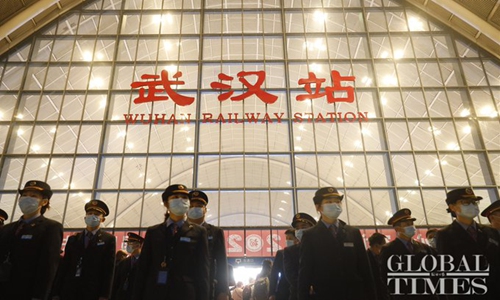HOME >> CHINA
China to prepare for prolonged external environment changes: Xi
Source:Global Times Published: 2020/4/9 1:40:59

Wuhan railway station reopens 76 days after city lockdown. Photo: Li Hong/GT
While initial success in China's anti-epidemic efforts has further consolidated and resumption of work and production has made major progress, China is still facing growing pressure to prevent an influx of the coronavirus and new difficulties and challenges have emerged for China's work resumption and economic and social development, as the pandemic continues to spread globally, Chinese President Xi Jinping said on Wednesday.
During a leadership meeting, Xi called for preparedness in mind and work to cope with prolonged external environment changes.
Xi urged unremitting efforts in guarding against imported cases from abroad and preventing a resurgence of the outbreak at home and demanded redoubling efforts in economic and social development.
He urged efforts to minimize losses caused by COVID-19.
Xi stressed paying close attention to the changes in the epidemic situation at home and abroad, calling for a prompt response that is more targeted and effective.
Xi's remarks at the meeting of the Standing Committee of the Political Bureau of the Communist Party of China Central Committee on Wednesday followed a significant step earlier in the day that marked a turning point in China's battle against the coronavirus.
Officials on Wednesday morning lifted a 76-day lockdown in Wuhan, the Chinese city that was hit the hardest by the epidemic.
However, even as Wuhan reopened, many places around the world, including the US, Italy and France, are continuing to grapple with dire situations over the pandemic. As of 2am on Wednesday (European time), there have been over 1.35 million confirmed cases of COVID-19, the illness caused by the coronavirus, including 79,235 deaths worldwide, according to latest data from the World Health Organization.
The Chinese mainland on Wednesday reported 62 new confirmed cases for Tuesday, including 59 imported cases and three local cases, highlighting the risks of an influx of infection cases.
The meeting of the top leadership on Wednesday also called for intensified epidemic prevention and control measures at the country's land and sea ports, strictly enforcing quarantine requirements for all inbound travelers at designated venues to minimize the risk of them causing local transmission.
While officials remain wary of the risk of a resurgence of the epidemic, they have also put much focus on reviving the economy to minimize losses incurred by the epidemic.
Noting that China's economic development faces growing difficulties, the meeting urged Party committees and governments at all levels to timely adjust their anti-virus measures in light of local conditions and create favorable conditions to the maximum for the resumption of work and production.
Since the outbreak of the epidemic, Chinese officials have rolled out a slew of measures to help businesses, particularly small businesses, get back on their feet, including financial support and tax cuts.
On Saturday, the People's Bank of China announced another targeted cut to the reserve requirement ratio, cash banks are required to take as reserves, for small and medium-sized banks to inject 400 billion yuan ($56.3 billion) in liquidity to help businesses.
It has also cut interest rates on excess reserves for financial institutions from 0.72 percent to 0.35 percent.
China will make its prudent monetary policy "more flexible and appropriate" to support the revival of the economy and guide more credit resources to help small, medium and micro businesses and private companies, according to a meeting of the Financial Stability and Development Committee under the State Council, China's cabinet, on Wednesday.
The meeting also called for efforts to prevent overseas financial risks from entering the domestic market, according to a statement.
RELATED ARTICLES:
Posted in: POLITICS